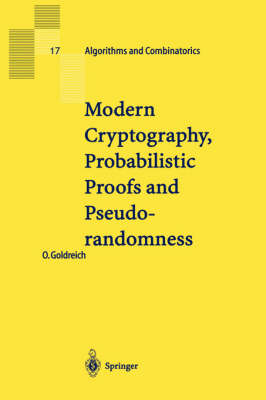
Stock image for illustration purposes only - book cover, edition or condition may vary.
Modern Cryptography, Probabilistic Proofs and Pseudorandomness (Algorithms and Combinatorics)
Oded Goldreich
€ 164.78
FREE Delivery in Ireland
Description for Modern Cryptography, Probabilistic Proofs and Pseudorandomness (Algorithms and Combinatorics)
Hardcover. This text focuses on three related areas in the theory of computation. The areas are modern cryptography, the study of probabilistic proof systems, and the theory of computational pseudorandomness. The common theme is the interplay between randomness and computation. Series: Algorithms and Combinatorics. Num Pages: 198 pages, 1 black & white illustrations, biography. BIC Classification: UYA. Category: (P) Professional & Vocational; (UP) Postgraduate, Research & Scholarly. Dimension: 234 x 156 x 12. Weight in Grams: 1030.
Cryptography is one of the most active areas in current mathematics research and applications. This book focuses on cryptography along with two related areas: the study of probabilistic proof systems, and the theory of computational pseudorandomness. Following a common theme that explores the interplay between randomness and computation, the important notions in each field are covered, as well as novel ideas and insights.
Cryptography is one of the most active areas in current mathematics research and applications. This book focuses on cryptography along with two related areas: the study of probabilistic proof systems, and the theory of computational pseudorandomness. Following a common theme that explores the interplay between randomness and computation, the important notions in each field are covered, as well as novel ideas and insights.
Product Details
Publisher
Springer
Format
Hardback
Publication date
1998
Series
Algorithms and Combinatorics
Condition
New
Weight
1029g
Number of Pages
183
Place of Publication
Berlin, Germany
ISBN
9783540647669
SKU
V9783540647669
Shipping Time
Usually ships in 15 to 20 working days
Ref
99-15
Reviews for Modern Cryptography, Probabilistic Proofs and Pseudorandomness (Algorithms and Combinatorics)
From the reviews: This book is intended for a reader with some knowledge of the theory of computing. It is divided into three chapters, each a survey of one of the topics mentioned in the title. The chapters may be read independently, and are somewhat different in nature. ...The book ends with four appendices. ... Read more
.png)